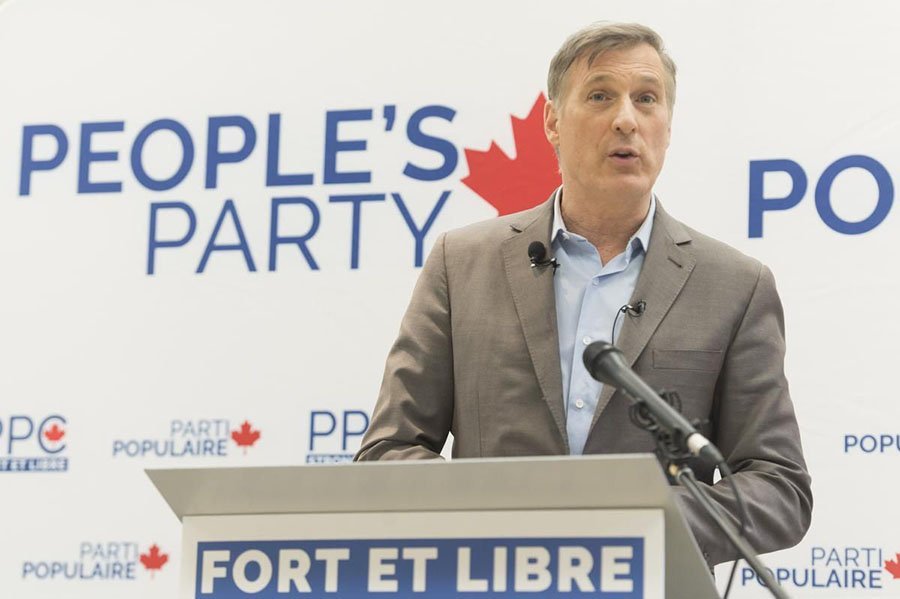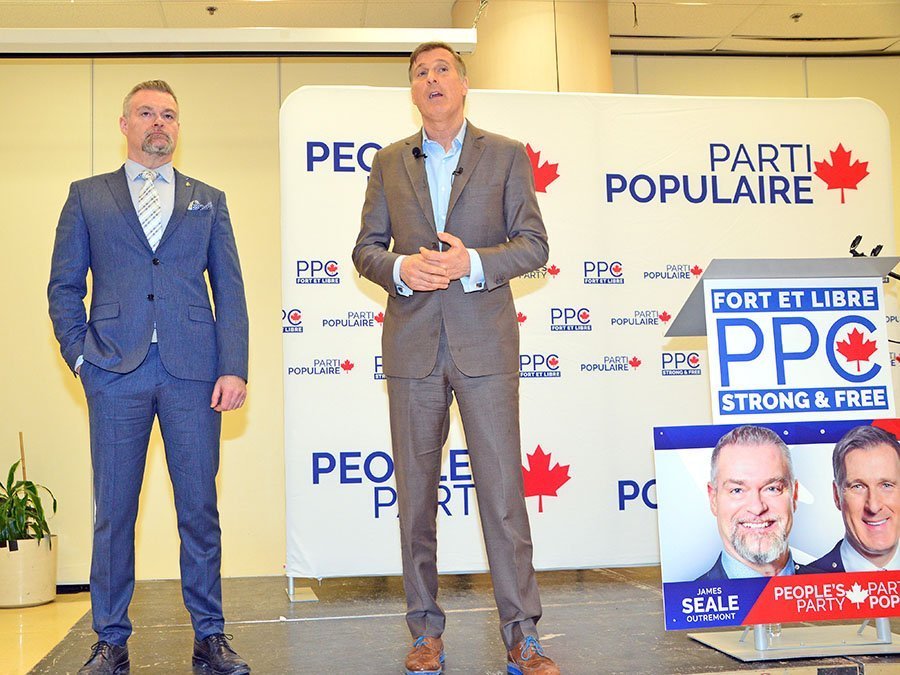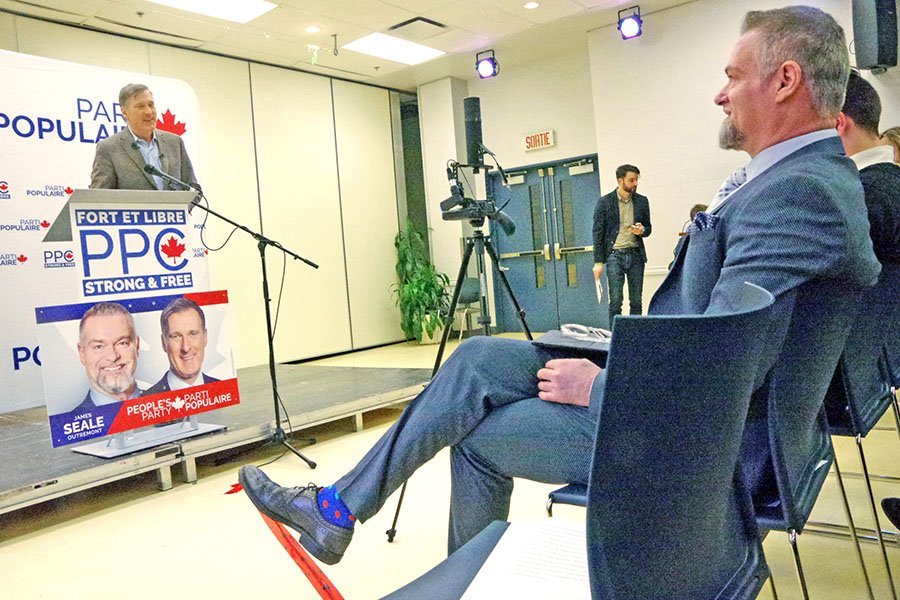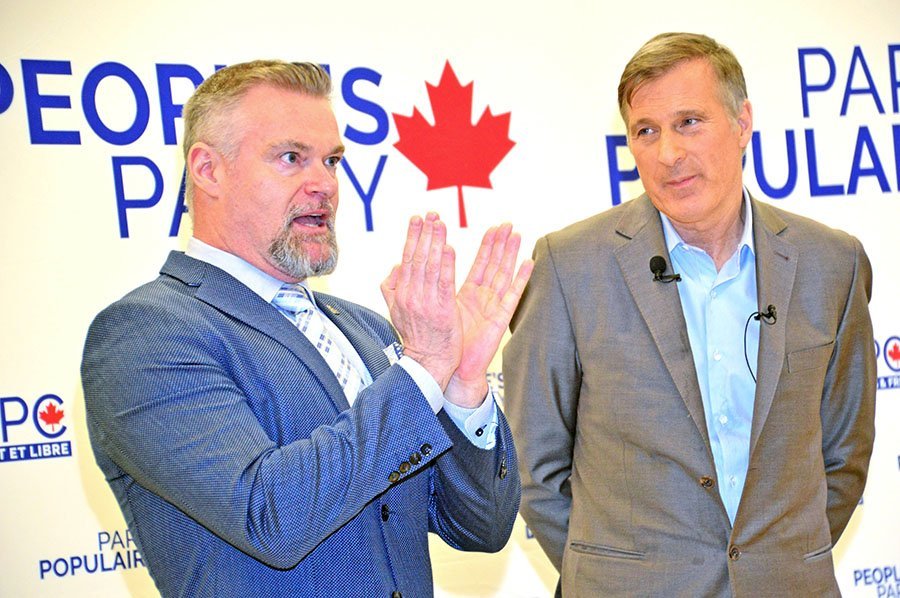
Martin C. Barry
When former federal Conservative cabinet minister Maxime Bernier was pondering what would make a good name for his new political party, he as well as supporters had some initial misgivings about “People’s Party of Canada.”
Naming the party
“In the beginning we had a debate about the name of our party,” Bernier recounted to a room full of followers who gathered in Côte des Neiges recently to announce the PPC’s candidate in the upcoming by-election in Outremont.
“People’s Party – that’s communist,” said Bernier, drawing raucous laughter from the crowd, while recalling a typical reaction from PPCers who are located a great deal more to the right on the political scale.

Vet running in Outremont
However, in the end common sense prevailed when it was suggested that the PPC needed an easily identifiable abbreviation so as not to become confused with other parties. The party’s launch event was held to officially announce the candidacy of Canadian Forces veteran James Seale as the PPC’s candidate in the Feb. 25 Outremont by-election.
While Bernier was making his pitch to a largely ethnic crowd in highly multicultural Côte des Neiges, he told them the PPC exists to unite Canadians under a single party banner regardless of their cultural origins.
“If you’re a Canadian of Chinese origin or of Indian origin you’re a Canadian and that’s important,” he said. “There’s no pandering. We won’t speak to you as a Chinese Canadian or a Muslim Canadian. You are Canadian first.”
A different approach
He sought to differentiate the PPC’s approach from most of the other federal parties, including the Liberals and the Conservatives. “They try to please every special interest group or every ethnic community in our country with special programs,” Bernier said.
Referring to Liberal Prime Minister Justin Trudeau and “his cult of diversity,” Bernier said Trudeau is “saying that diversity is our strength, and we all know that it is not that. It is what unites us that is our strength. We must celebrate what unites us.”
Currently garnering up to 6 per cent support in Quebec in recent Léger opinion polls, Maxime Bernier is regarded by a rising number of supporters as a dependable politician who is known for speaking his mind. He is said to harbour strong beliefs in personal responsibility and freedom. In his public statements, he expresses these values as well as an unwavering commitment to reducing the size of government.

A fierce competitor
According to an official biography posted on the PPC website, Bernier was born Jan. 18, 1963, in St-Georges-de-Beauce. He is the father of two girls. He is also a dedicated and experienced runner and has participated in a number of marathons. Regarded as a tough and determined competitor, Bernier once ran 106 kilometres across his constituency, completing the run in 13 hours, while raising $165,000 for a Beauce food bank.
He has a long-standing interest in business and during his career worked for several financial and banking institutions before becoming executive vice-president of the Montreal Economic Institute in 2005. Various people from his region encouraged him to enter politics. He took up the challenge and was elected the MP for Beauce on January 23, 2006, with the largest majority outside Alberta. He was appointed to Cabinet on February 6, 2006 as Minister of Industry.
Quit the Tories last year
Under the Conservatives, Bernier also served as Minister of Foreign Affairs. He was re-elected to represent Beauce on October 14, 2008. Re-elected again in May 2011, he was appointed Minister of State for Small Business and Tourism.
Although re-elected another time in November 2015, on Aug. 23, 2018, he left the Conservative Party of Canada to sit as an independent MP and soon announced the launch of the PPC. Since receiving official party recognition in January, Bernier and the PPC have been increasingly perceived as a thorn in the side of the Conservatives.

Highly critical of the CPC
In a statement he issued last August explaining his decision, Bernier stated: “I know that the free-market conservative philosophy has the best solutions to ensure our society is more prosperous, secure, and peaceful. However, my party’s stands on several issues have convinced me that under the current leadership it has all but abandoned its core conservative principles.
“Instead of leading as a principled Conservative and defending the interests of Canada and Canadians, Andrew Scheer is following the Trudeau Liberals,” he continued. “A Conservative party that supports free markets should also advocate the end of corporate welfare … I am now convinced that what we will get if Andrew Scheer becomes prime minister is just a more moderate version of the disastrous Trudeau government.”














